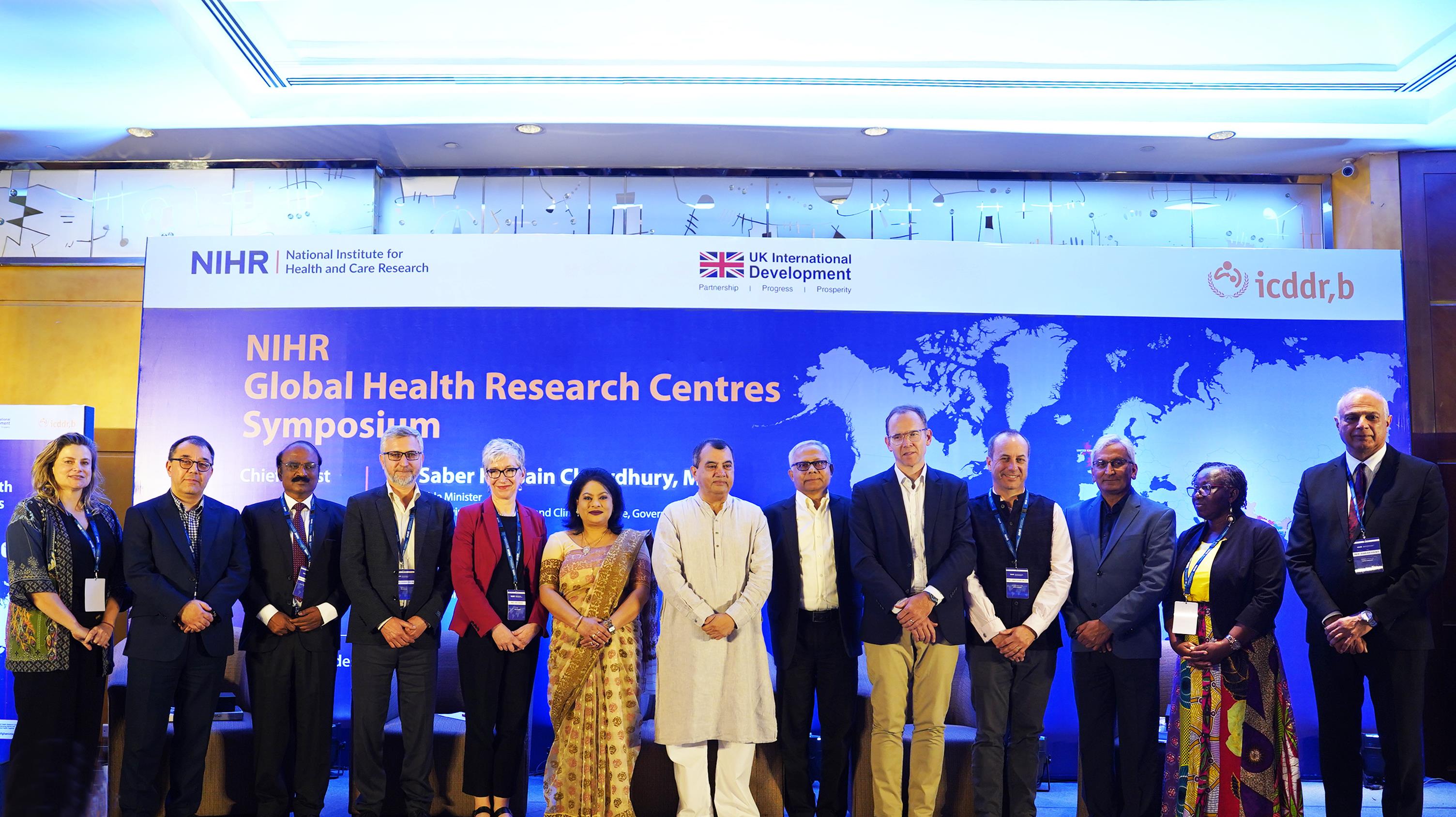
Published: 22 April 2024
The first in a series of annual symposia for the NIHR’s Global Health Research Centres took place in Dhaka in March.
The symposium brought together attendees from all five of the centres in West Africa, Latin America, South Asia and South East Asia - as well as representatives from the NIHR, the UK Department of Health and Social Care, the Bangladeshi government and other stakeholders.
The event took place from 4-7 March 2024 in Dhaka, Bangladesh. The aim of the symposium was to strengthen synergies and facilitate shared learning across the NIHR Global Health Research Centres and relevant stakeholders. Attendees convened to discuss progress, challenges and lessons learnt from the first year of the programme.
The 60 attendees took part in presentations, discussions, panel sessions and networking events to share learning and expertise. They were encouraged to share their monitoring and evaluation strategies with each other, and began to explore how they might work across centres to develop shared resources in areas where their interests overlap, for example on methods for testing digital health solutions and a common capacity needs assessment tool.
What are the NIHR Global Health Research Centres?
The Global Health Research Centres programme funds research-driven partnerships between institutions in low and middle income countries (LMICs) and in the UK. The centres conduct high-quality research and strengthen LMIC institutional capacity to undertake, manage and disseminate applied health research.
The five centres are:
- NIHR Global Health Research Centre in Community Management of Long-Term Conditions. This centre is a collaboration between Queen Mary University London and Pontificial Javeriana Universidad. It covers Colombia, Guatemala and Bolivia.
- NIHR Global Health Research Centre in Improving Mental and Physical Health Together. This centre is a collaboration between the University of York and Aga Khan University Hospital Karachi. It covers Pakistan and Afghanistan.
- NIHR Global Health Research Centre in Multiple Long-Term Conditions. This centre is a collaboration between the University of Leicester and the Public Health Foundation of India. It covers India and Nepal.
- NIHR Global Health Research Centre in Non-communicable Diseases and Environmental Change. This centre is a collaboration between Imperial College London and the George Institute for Global Health. It covers India, Indonesia and Bangladesh.
- NIHR Global Health Research Centre in Non-communicable Disease Control in West Africa. This centre is a collaboration between LSHTM and Ghana College of Physicians and Surgeons. It covers Ghana, Niger and Burkina Faso.
Shaping the future of global health
The symposium’s opening address was given by Saber Hossain Chowdhury, MP, the Honourable Minister for the Ministry of Environment, Forest and Climate Change, Government of Bangladesh. He spoke about how important it is that health indicators are included in the country’s climate action plan. Climate change is posing a severe threat to Bangladesh, he said, and driving a change in the burden of disease, for example through the increased salinity of water in coastal areas. Addressing this issue through research is vital, he said.
Matt Cannell, Acting High Commissioner, British High Commission, Dhaka said: “I am delighted to see targeted investment in Non-Communicable Diseases (NCDs) in Bangladesh and other countries by UK-funded Global Health Research. This will help tackle cardiovascular diseases, chronic respiratory diseases, diabetes, mental disorders and other NCDs.”
The symposium was hosted by icddr,b, one of the partners of the NIHR Global Health Research Centre for Non-communicable Diseases and Environmental Change.
After the symposium, Professor Kara Hanson, NIHR Programme Director for Global Health Research, said: “This inaugural symposium was a great success, and the NIHR is incredibly grateful to the team in Bangladesh for hosting it so effectively. It was exciting to see the Global Health Research Centres come together to share learning and embrace new ways of working. The Centres are themselves an intervention in the research ecosystem, with their substantial focus on capacity strengthening alongside their research. We look forward to working with them to establish a monitoring and evaluation framework, and common indicators, to set targets and measure success as we seek to deliver crucial research on NCDs and increase research capacity.”

